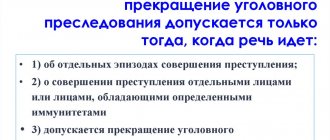Grounds for termination
All the grounds on which a court order is issued to terminate a criminal case are divided into three groups:
Grounds and procedure for termination of criminal proceedings and criminal prosecution
- identification in court of certain circumstances that make further proceedings inappropriate;
- refusal of the accuser to withdraw the charges previously brought against him. The main reason for such an action on the part of the prosecutor is the lack of a sufficient number of facts of evidentiary value. The refusal of the public prosecutor from his position may be complete or partial;
- reconciliation or active repentance of the accused. In the first case, a statement is received from the injured party, which sets out a request to complete the trial. The main condition under which such an action is permissible is that the criminal act committed must be of minor or moderate severity. To terminate a criminal case due to active repentance, a combination of a number of conditions is required. The suspect himself came to law enforcement agencies and declared his involvement in the crime. During the investigation, he named all the circumstances and facts of the case. In addition, there must be signs of a desire to make amends. Termination of criminal proceedings due to reconciliation of the parties and active repentance is left to the discretion of the presiding officer.
Is it possible to dismiss criminal cases in jury trials? Yes, this is possible, but such decisions are made not by the jury, but by the presiding judge. At the same time, the list of possible grounds has been significantly reduced.
Considering the termination of a criminal case in court, its grounds and procedure, such a fact as the establishment of new circumstances was mentioned. This is a fairly broad group of grounds specified in Article 254 of the Code of Criminal Procedure of the Russian Federation. Therefore, they are worth considering in more detail. These circumstances include:
- decriminalization of the crime, parallel to the trial process, but before a conviction;
- lapse of time;
- death of the defendant. The only exceptions are those cases in which the logical conclusion of the trial is required for the rehabilitation of the deceased;
- failure of the victim to submit a statement, without which the proceedings cannot be carried out. We are talking about cases of private prosecution;
- lack of consent of official bodies in relation to special entities. We are talking about inviolable persons - judges, deputies, the president, etc.;
- issuance of an amnesty document.
According to Article 254 of the Code of Criminal Procedure, each of the above points must be considered individually, based on the circumstances of the case under consideration. It should be noted that there are a number of problems associated with the need to terminate a criminal case during the proceedings. Basically, they are created when amnesty acts are issued, when the court needs to correctly apply them to the guilty person.
Grounds for termination of criminal prosecution and cases under the Code of Criminal Procedure of the Russian Federation, Article 212
Everything about criminal cases
All about reconciliation with the victim
A statement from the victim is required
Url Additional information:
— 25 Code of Criminal Procedure
termination of the case - only on the basis of a statement from the victim
Please note that the norm is 25 Code of Criminal Procedure
it is said that the termination of the case is carried out on the basis of a statement from the victim. Is it possible to make do with an oral statement? Although this provision does not directly require this, in practice judges require that the application be written.
Served specifically to victims
An important aspect: it is the victim who must submit this application. (That is, this option - for the defendant to take a signed statement from the victim and submit it to the court - may not be understood by the judge).
A)
Or the victim himself must file a statement in court - this is the best option.
b)
Or he must submit an application through the court office if he does not want to participate in the meeting. In this case, a petition from the victim should be submitted at the same time to consider the case without his participation. This is not a desirable option for the defendant as it reduces the likelihood of the case being dismissed.
Url Additional information:
- paragraph 22
Plenum No. 19 checks the awareness of the statement of reconciliation
Judges prefer that the victim personally confirm the fact of reconciliation ( paragraph 22
Plenum No. 19).
ADVICE: therefore, in order for the victim to have the motivation to appear at the court hearing, it would be reasonable to make compensation for harm (or at least part of it) right in the court corridor, on the day of the court hearing.
Victim's statement to terminate the case
DOWNLOAD simple form: You cannot download files from our server
— such an application can be submitted at three stages:
Url Additional information:
- part 1 212 of the Code of Criminal Procedure
grounds for termination of a criminal case at the investigation stage
A)
during the preliminary investigation.
Url Additional information:
- Part 2 239 Code of Criminal Procedure
termination - at preliminary hearing
b)
during the preliminary hearing.
Url Additional information:
— clause 3 254 Code of Criminal Procedure
termination - at a court hearing
— P.
Plenum No. 51 clarification of the right to reconciliation in the preparatory part
V)
during the trial.
- below we have given an illustration - a completed application form for a real criminal case.
— in order to correctly fill out the form for your case, using other circumstances, we recommend using information from the publication on this topic: Reconciliation with the victim
, conditions and mechanism for termination of the case.
Statement by the victim to terminate the criminal case due to reconciliation of the parties
I reconciled with the defendant, he apologized to me, I completely forgave him, I have no complaints against him and do not wish him any punishment.
- I was compensated for property damage by paying _________ rubles.
— moral injury
I was compensated by paying ________ rubles, as well as by apologizing to the defendant.
- I confirm that at the moment all the consequences of the blows have been completely eliminated, the wounds have healed, and my health has been fully restored (note: the sample below was used in a criminal case under Part 1 112 of the Criminal Code
, hence the wording about the consequences of impacts).
I ask you to terminate the criminal case against the defendant, because he reconciled with me and made amends for the damage
harm to me.
Victim________________________
DOCUMENTS for termination of the case
We recommend using a package of three documents:
| I | Victim Statement Victim Statement on termination of the case, confirms reconciliation (main document) |
| II | Victim's receipt Victim's receipt on compensation for damage (property and moral) |
| III | Petition of the accused Motion to Terminate reconciliation cases, analysis of compliance with conditions |
Return to the list of materials
Seek advice
Motion to dismiss the case
Initially, the Bank filed a claim to collect the loan debt and foreclose on the mortgaged property. In the claim itself, the Bank asks for a penalty to be imposed on the land plot, without indicating the building that stands on this land plot. Although the building was already registered in the Registration Chamber even before the claim itself. The judge made a ruling on the appointment of an appraisal examination and asked 2 questions. 1st - determination of the market value of the land plot, 2nd - determination of the market value of the land plot together with the buildings located on it. The expert answered the 1st question, and on the second indicated that there were buildings - a house, and asked the court for documents for the house in order to answer the 2nd question of the court. The court did not request documents from the parties for this building and, accordingly, the experts drew up an opinion on only one issue, number 1. Next, the parties at the court session entered into a settlement agreement with a payment schedule. The bank in the settlement indicated that if the defendant violates the agreement, they will be forced to apply to the court for a writ of execution to collect the remaining amount of the loan and foreclose on the mortgaged property - the land plot. And no one mentioned anything about the house in the world report. Apparently the Bank was initially happy that the settlement had been concluded. The magistrate court indicated that the parties were familiar with Articles 220-221 of the Code of Civil Procedure and the case was dismissed. Further violation of the settlement agreement by the defendant, the Bank received a writ of execution, the bailiffs initiated enforcement proceedings, even sent the plot for auction, but the commission returned the execution documentation to the bailiffs, saying that there was a house on the land plot. The bailiffs returned the writ of execution to the Bank. The bank subsequently filed a claim with the same court to foreclose on the property. Again, in their claim, they refer to this loan agreement, attach a ruling on approval of the initial settlement agreement and ask the court to foreclose on the house. The defendant in court firstly filed an objection to such a statement, and secondly, a petition in writing with a request to terminate the civil case since the issue had already been resolved in this regard at the first court hearing and the fact that the Bank did not react in any way to the fact that the appraisers asked for documentation the building was ignored; in the settlement agreement, which they themselves developed, they did not indicate the buildings on the land plot. Since there was already a court decision on this dispute - a ruling on approval of the settlement agreement and the case was terminated, accordingly, on the basis of this, we and the court asked the new case to be terminated. To which the judge replied, since “I do not go into the deliberation room, I will not make a ruling on this petition; my refusal will be reflected in the minutes of the court session.” In response to our request with the defendant to nevertheless issue a reasoned ruling on our petition, she once again indicated that she would not issue it. How to deal with this? Then she said (after the meeting) that the petition should have been filed to leave it without consideration, then I would have made a ruling, that’s what she said. I told her, as a representative of the defendant, that this is about dismissing the case, not leaving it without consideration. And that according to the Civil Procedure Code they are required to make a determination. the petition was submitted in writing. she didn't answer. in the same process, it approved the Bank's application for an assessment of the building. To which the judge issued a positive ruling, with this ruling she suspended the procedural actions until the experts prepared their conclusions. I'm completely confused, I don't know what to do now, since she didn't issue a separate ruling on our stated petition to dismiss the case, how to appeal and what - isn't it a protocol of the court session? submit a comment on the minutes of the court session? should we write a written statement so that the judge, at our request, will issue a reasoned ruling? appeal the decision to appoint an appraisal examination for this house? I ask for your advice. what to do right in this situation.
Drawing up a resolution
According to the Code of Criminal Procedure, a magistrate’s decision regarding the termination of the criminal case, on the basis of which the prosecution against the defendant ends, must be served on each interested person. The decision made by the magistrate court must be served no later than 5 days from the date of its preparation. This document is drawn up in compliance with a number of specific requirements set forth in regulations.
It must be said that the termination of a case during a trial is an independent procedural decision of the court, which, however, can be appealed in the manner prescribed by law. Like any other decision, this resolution comes into force 10 days after its adoption. During this period of time, you can appeal such a decision on appeal.





